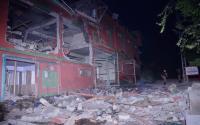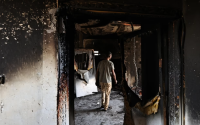9 April 2007The Boston Globe
The CIA and the Pentagon would for the first time be required to assess the national security implications of climate change under proposed legislation intended to elevate global warming to a national defense issue.
The bipartisan proposal, which its sponsors expect to pass in Congress with wide support, calls for the director of national intelligence to conduct the first-ever "national intelligence estimate" on global warming.
The effort would include pinpointing the regions at highest risk of humanitarian suffering and assessing the likelihood of wars erupting over diminishing water and other resources.
The measure also would order the Pentagon to undertake a series of war games to determine how global climate change could affect U.S. security, including "direct physical threats to the United States posed by extreme weather events such as hurricanes."
The growing attention to global warming as a national security issue could open new avenues of support for tougher efforts to limit greenhouse gases, specialists say.
"If you get the intelligence community to apply some of its analytic capabilities to this issue, it could be compelling to whoever is sitting in the White House," said Anne Harrington, director of the committee on international security at the National Academy of Sciences in Washington.
"If the White House does not absorb the independent scientific expertise, then maybe something from the intelligence community might have more weight."
The measure, sponsored by Senator Chuck Hagel, a Nebraska Republican, and Senator Richard Durbin, an Illinois Democrat, comes as other international bodies are taking steps to designate global warming as a high international priority.
The UN Security Council has put climate change on its agenda for the first time, warning that global warming could be a catalyst for new conflicts around the world. The council said it would hold a high-level meeting on the issue later this month.
"The traditional triggers of conflict which exist out there are likely to be exacerbated by the effect of climate change," said Emyr Jones Parry, the British ambassador to the UN.
Growing concerns about the implications of global warming have also led some Republicans and Democrats to give the issue far more prominence in policy circles.
"For years, many of us have examined global warming as an environmental or economic issue," Durbin said in remarks last month. "We also need to consider it as a security concern."
The national intelligence assessment, which will be drafted by U.S. spy agencies, would rely on the latest scientific data. It would identify places where countries or ethnic groups are most likely to fight over resources; where large migrations of victims will occur; how global warming would affect global food supplies; and the increased risks to humans from infectious disease.
John Hamre, who served as a deputy secretary of defense in the Clinton administration, said warming couched in security terms would make it far more difficult for politicians to ignore.
"What makes this interesting is the clear effort to make the politics of global warming broader," said Hamre, who is president of the Center for Strategic and International Studies. "There are legitimate security issues associated with this question."






